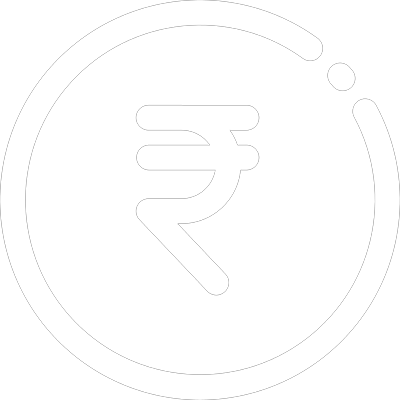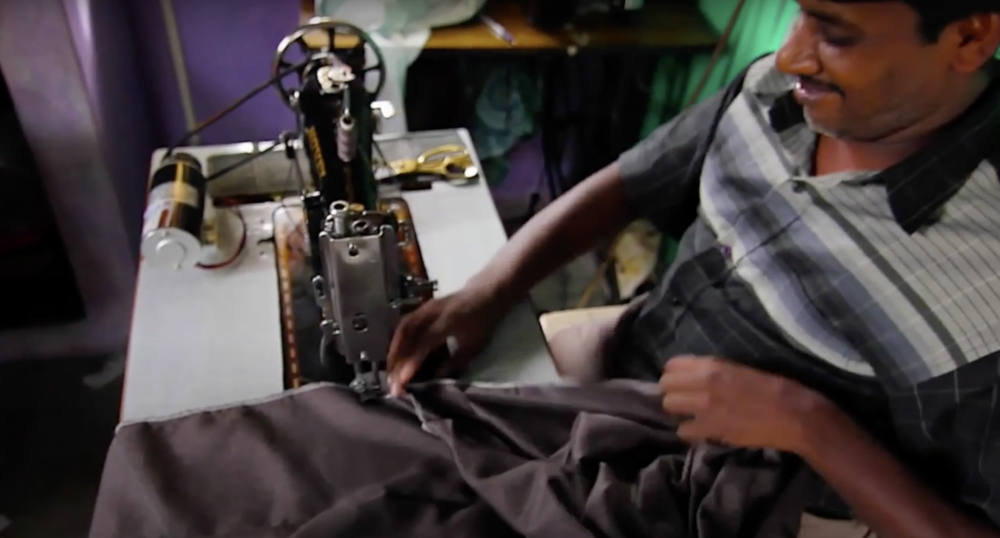Background and Solution
Mr. Venkatesh, a tailor in the Kolar region, Karnataka was using an electric sewing machine for his work. There were frequent power cuts because of which he could only operate the machine for four hours a day. As he has polio, it was difficult for him to operate the machine by foot. Despite having a strong customer base, he could only stitch 2-3 pieces per day and hence was limited in his capacity to meet demand.
A local enterprises had organized a demo at a nearby village for solar home lighting systems. Mr. Venkatesh was present at the demonstration and recognized an opportunity to make his sewing machine gridindependent. SELCO has been working on energy efficient machinery for various livelihood activities to increase productivity. This expertise coupled with a thorough need assessment resulted in the creation of a highly efficient solar powered sewing machine.
With the technical solution intact, SELCO approached a local bank, Pragati Krishna Grameen Bank to assist Mr. Venkatesh with a loan for buying the motor and solar system. Initially, the bank manager refused the loan citing lack of service from companies selling solar products as the reason. Hence the bank was skeptical about financing solar products. In order to build the confidence of the banker, SELCO did two things:
-sent out technicians to service other companies’ products and assured people that they would re-visit the system once every six months. - visited the Regional Manager of the bank to impress upon him the relevance of the product and the need for financing for entrepreneurs like Venkatesh. Following this, the Regional manager directed the branch manager to disburse the loan at the earliest.
Once the confidence of the bank manager was restored, he agreed to finance Venkatesh. From the day Mr. Venkatesh made the enquiry till the day the system was installed took a total of seven months.
Technological Solution
SELCO replaced the inefficient universal motor with a more energy efficient DC motor (60 W) and solar powered the system. Solar panels of 60 Wp with 30 Ah battery were used to provide 8 hours of backup/day. The system was designed to run for 8 hours a day. Had we not replaced the universal motor with a DC one, solar panels of 100Wp would have to be used and the system would have been double the cost. Hence it was an important step to scout and implement a more efficient motor.

Financial Model and Scheme
The total cost of solar powering the whole system was Rs.18,000. Out of this, Rs.2,000 was paid by Mr. Venkatesh, Rs.3,000 was a contribution from SELCO Foundation and Rs.13, 000 was given as a loan by the bank. The EMI for the loan is Rs.450 per month for three years. His revenue was initially between Rs.350-400 a day but after solar powering the system, his revenue has gone up to Rs.700-Rs.800 a day. Due to solar powering the setup, his electricity bill has also come down by Rs.16-Rs.18 a month based on an initial calculation. There has been a significant increase in income after solar powering the machine and Mr. Venkatesh says that he has no problem paying the EMI.
While the loan was for 3 years, the recovery of such projects could be potentially within a year as well.
Project Nuances
As Venkatesh was disabled, the bank wanted the loan to be disbursed through the joint account with his wife so that they have an assurance of repayment. However, the SELCO Branch Manager outlined to the bank manager that a joint account would be difficult for both Venkatesh and his wife as they would need to visit the bank multiple times for paper work. He pointed out the fact that lack of conveyance options from the village would also be a big hurdle for both of them to visit the bank. The banker conceded and went on to finance Venkatesh individually.
Testimonial
"Installing of a motorised solar powered sewing machine helps me immensely. I can do twice the amount of work, and my income has doubled as well. Earlier I had to say no to customers, especially during wedding season.
Once in 6 months, the local enterprise comes to check and service my system. I am smoothly able to pay back the loan. The Panchayat has also assisted for a new house. With this new income, I am also able to contribute to the house construction."
Venkatesh
Impact
Previously the poor power supply conditions restricted Mr. Venkatesh’s working hours to approximately 4 hours per day and this included an hour of manual pedaling. After the intervention, he is able to work for 8 hours per day.
Initially, he could cater to 2-3 customers per day and had profits of about Rs.2,000-Rs.2,500 per month. After the intervention, he can cater to 6-7 customers per day and has a profit of about Rs.4,500-Rs.5,000 per month.
He is also saving between Rs.16-Rs.18 a month on electricity bills.
